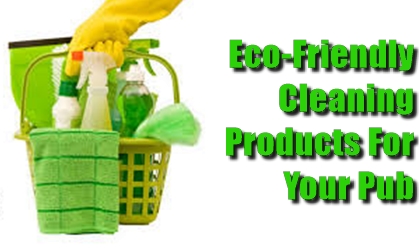As an employer you have a responsibility to keep your staff healthy and as a publican your customers happy. Toilets have to be cleaned and sanitised daily, kitchens must be maintained at the very highest level as food preparation takes place there, and germs (bacterial and viral) must be eliminated to avoid the risk of food poisoning. There is growing concern for the effects of the chemicals contained in cleaning and sanitising products have on the environment. Growing public awareness mean that creating “green” credentials for your business is becoming an important factor in consumer choices. There are two main types of chemical you should try and avoid, solvents and volatile organic compounds (VOC).
Recognising the potential risks of solvents and VOC should form an important part of your Control of Substances Hazardous to Health policies and statements.
Solvents & VOCs
Some of the chemical ingredients in solvents are highly toxic to the environment and people exposed to them. Common solvents include Propylene Glycol Ethers (PGEs), esters, alcohols, and Ethylene Glycol Ethers (EGEs). Their toxic nature includes carcinogenic properties and would add to the Volatile Organic Compounds present in the air.
You should avoid VOCs which are the toxic fumes released from certain liquids and solids. The effect of VOC release is consistently higher indoors than outdoors, with some of the most common and popular cleaning supplies, paint (and paint thinners), plywood and MDF board used in walls, emitting these fumes. Combined with poor ventilation these fumes can present a significant risk to you, your staff and your customers.
Some of the most common include eye irritation, headaches, flu-like symptoms, dizziness and asthma attacks and have been linked to cancer. If your pub cleaners use a spot cleaning solution for carpeting or fabric cleaning, a floor cleaner or toilet and kitchen cleaners or glass and multi-purpose cleaners you may be at risk of exposure to VOCs. Reduction of exposure to VOCs is an important part of your health and safety regimes. You can become exposed through use in poorly ventilated areas and even from the containers they are stored in.
Plant Based Cleaners
You should try and use plant based products which are chemical-free and toxic-free. With plant-based products, there is reduced chance of the emission of VOCs as they do not include them in their contents. It is possible to achive the same level of cleanliness you expect with the more harmful products that contain synthetic chemicals.
You should think of the environment when choosing cleaning products as some of the most commonly used products are some of the biggest contributors to water pollution (they don’t dissolve into non-toxic components) and when put down the drain they retain their harmful effects. Even biodegradable products have different rates of dispersion and degradation and you should look for products that bio-degrade within 28 days.
Neutral pH Cleaners
Just like simple soaps you should try and use Neutral pH products. Differing pH levels dictate the reaction of the cleaning product with the surface being cleaned, the reaction with the environment when interacting with the water system and the reaction of the product with your skin.
A neutral pH of 7.0 will be non-reactive and easily damaged surfaces, such as marble, are unaffected by neutral pH cleaners. No matter how often a neutral pH product is used, there is no harmful residue build up on the surfaces that are cleaned, such as countertops, tables and carpets.
For example, a pH value over 7.0 is considered to be an alkali, such as bleach (which is one of the reasons it is banned in pubs). Acidic compounds have a pH under 7.0.
Most janitorial and catering suppliers will stock these products and be able to advise you on the correct solutions for your pub and provide full COSHH documentation and training in their use.
